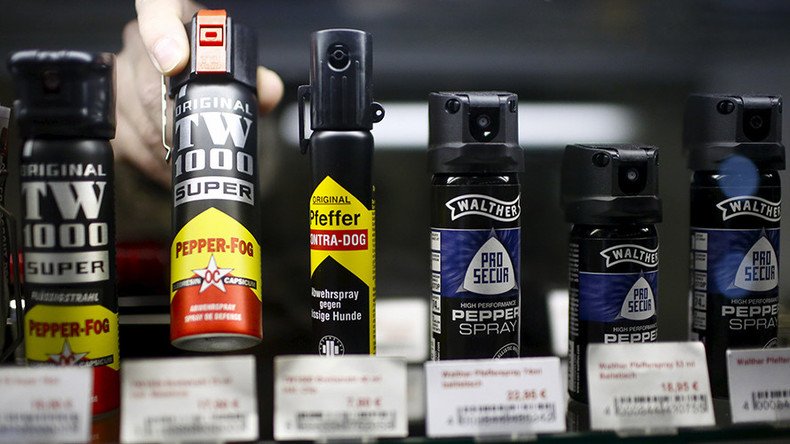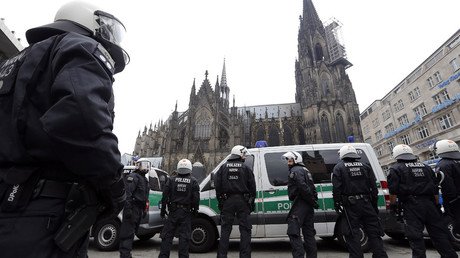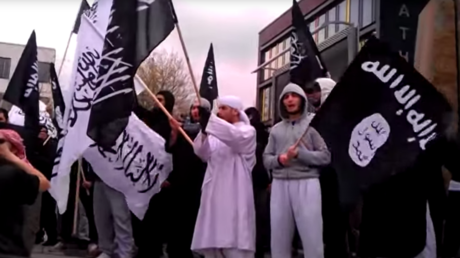The largest German chain of retail stores that typically specializes in selling non-prescription medicines, cosmetics, healthcare and household products has added pepper spray to its ordinary product line, citing “growing demand” from customers.
Pepper spray labeled “animal deterrent spray” has been available in the shops of the German DM drug-store chain since June 23 and in its online shop since May 9, Tagesspiegel reports.
There has been “an increased demand from female customers,” who “wanted to purchase the spray at a convenient location," DM CEO Sebastian Bayer told Tagesspiegel, adding that the company “checked it out and decided to make the animal deterrent spray available in its stores."
Bayer also said that the response from the female customers was "overwhelmingly positive” while a source in the company’s shop in central Berlin told the paper that the spray “sells very well, especially in the last weeks.”
The DM CEO refused to comment on whether the increased demand for the pepper sprays was provoked by the wave of sexual assaults on New Year’s Eve or by the recent violent incidents in Munich, Ansbach and Wurzburg but stressed that it reflects growing safety fears in society.
A spokesman for DM’s rival retail chain, Rossmann, said it doesn’t plan to follow in its competitor’s footsteps. "Pepper spray is essentially something used against humans. We are a drug store. We don’t sell batons or pistols, or pepper spray – we leave these products to specialists,” he said.
DM’s move was also criticized by the head of the German Association of Gun Makers and Professional Arms Traders, Ingo Meinhard, who called it “questionable” and said the use of pepper spray required special training.
At the same time, professional arms traders also confirm an increased demand for self-defense means such as pepper sprays both from men and women, provoked by New Year’s Eve attacks and recent incidents.
In the first half of 2016, the number of the small arms licenses, which allow a person to carry a tear gas or a blank firing gun under German laws, increased by about 50 percent and reached 402,000, Suddeutsche Zeitung daily reports, citing the Interior Ministry.
Under German law, a pepper spray is considered equivalent to a weapon and can be purchased only after acquiring a special license. However, when it is labeled as an “animal deterrent spray” that should be used only against aggressive animals, it can be bought without a license.
The use of such “anti-animal” spray against another person could be acceptable in some self-defense cases but if any third parties are injured the user would be held responsible.
Police advised the citizens against using such means of self-defense and “arming themselves.” Purchasing the means of self-defense “gives a person a delusional feeling of security and changes individual perception,” a spokesman for the German Police Association told national media.
He also stressed that the use of self-defense means can often lead to an escalation of the situation and “provoke even more violence in the worst case.”
At the same time, some politicians supported people’s drive for self-defense. On August 20, the leader of the right-wing Alternative for Germany (AfD) party, Frauke Petry, spoke out in favor of people purchasing arms and other self-defense tools.
Petry said that many people in Germany are now feeling unsafe and they should be able to defend themselves as well as their families, stressing that police do not always timely react to various incidents. She also opposed tougher gun laws by emphasizing that they would only affect decent citizens and not those purchasing illegal arms online via the dark web.
In Munich, an 18-year-old, who killed nine people with a handgun in a shopping mall before killing himself in late July, purchased the illegal weapon he used online.
Germany witnessed a wave of terrorist attacks and violent incidents in recent months. On August 15, a man was injured in a stabbing and shooting attack in the German city of Cologne.
On July 18, an “unaccompanied minor” from Afghanistan armed with an ax and a knife attacked passengers of a train in Wurzburg, injuring five people. On July 24, a 27-year-old Syrian who had been rejected asylum, set off an improvised bomb hidden in a backpack, killing himself and injuring 15 people. Both attacks were associated with Islamic State (IS, formerly ISIS/ISIL).
On July 22, an 18-year-old German-Iranian went on shooting spree in the city of Munich. The gunman killed nine people and injured 27 and later also committed suicide. On July 24, a Syrian asylum seeker, aged 21, killed one person and injured five others in a machete attack in the German town of Reutlingen.
In May, a man shouting “Allahu Akbar” killed one person and injured three more at a train station in the town of Grafing near Munich.



